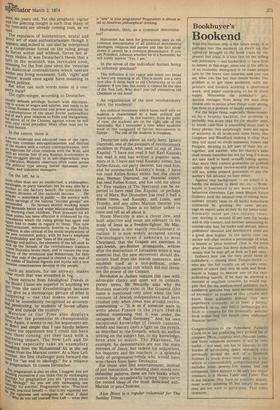Bookbuyer's
Bookend
With the election only a few hours away, it is perhaps not the moment to dwell on the upheaval brought to the book trade by the present fuel crisis. It is true that on the selling side publishers — and booksellers — have little to lament at this stage, since one of the effects of an economic emergency is to make people turn to the lower cost luxuries, and you can say what you like but that means books. The problem is to get them produced, with the printers and binders working a shortened week, and paper continuing to be in short supply. Meanwhile the publisher's production manager, from being the man they tended only to notice when things went wrong, has risen to a position of heady eminence.
For the larger firms, especially those cosseted by a healthy backlist, the problem is probably less acute than for the smaller ones, to whom cash-flow is something more than a fancy phrase. Not surprisingly there are signs of economy at all levels,with some firms, like Longman and Blandford, making it clear that they will stand no credit nonsense; others like Penguin, deciding to kill part of their list altogether; and another, who for charity's sake shall remain nameless but not for long if it does, not take itself in hand, actualfy telling agents that since they cannot guarantee to publish within the agreed twelve-month period they will not, unless pressed, guarantee, to pay the author's full advance on time either.
Against that background — on which it is hardly the moment to dwell etc, etc — Book buyer is heartened to see more civilised behaviour elsewhere. Last week Messrs Victor Gollancz took the unusual step of raising their authors' royalty rates on all books henceforth contracted by granting the same percentage on export sales as they do for home sales.
Normally there are two royalty rates: one, starting at around 10 per cent for books sold in this country, and another, amounting to considerably less, for books sold abroad, where publishers' discount and distribution costs are a good deal higher. In the latter case the author will often receive a percentage of what is known as 'price received' (that is, the price after the discount has been deducted) which means that he may get as little as 5 per cent.
Gollancz now join the very small band of publishers — among them Temple-Smith — who pay the full royalty on all copies irrespective of where they may be sold, and Bookbuyer is happy to bestow one of his rare publishing laurels. If he may be allowed a moment of ungallant cynicism, he would suggest that for the medium-sized publisher such handsome gestures may soon become matters of necessity: as readers of this column will
know, those publishers without their own paperback company. or at least a formal paperback tie-up, may find it increasingly difficult to compete for the potentially saleable book unless they can dangle some additional financial carrot.
Congratulations to the Publishers' Publicity Circle on at last producing their printed list of company PROs, complete with christian names and home telephone numbers. It will be very useful — not least, one has to suppose, to the hordes of advertising space salesmen who previously needed the skill of a Sherlock Holmes to track down their prey. In a list which is commendably comprehensive and includes some seventy-five names and 100 companies, there appears to be only one major omission. It is Messrs Faber and Faber. This is not because they have no publicity department worth speaking of, but simply because they did not want to participate. That takes character.
































 Previous page
Previous page